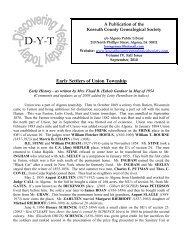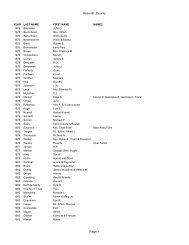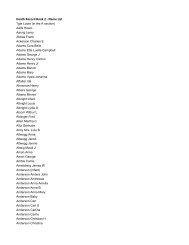September 2009 - Kossuth County Genealogical Society
September 2009 - Kossuth County Genealogical Society
September 2009 - Kossuth County Genealogical Society
You also want an ePaper? Increase the reach of your titles
YUMPU automatically turns print PDFs into web optimized ePapers that Google loves.
D-Y-T <strong>September</strong>, <strong>2009</strong><br />
cushioned with an old tattered quilt or maybe a sack filled with hay. In the back of the box were six<br />
cane seat chairs, gift from the Potters, and other wedding gifts, dishes, silverware, etc. At that time<br />
Nathan was milking nine cows that he rented for $9.00 each per year, he keeping the calves. This was<br />
big interest on a small investment for at that time a good cow could be bought for $25.00 or $30.<br />
Having finished the usual round of chores we returned to the old home. In the meantime the tables had<br />
been taken down, the room cleared, violins brought forth, and we danced till three in the morning.<br />
About a year earlier Dr. Potter had purchased a farm two miles south and built what was then<br />
considered a nice home. He retired from his practice at Gillan (in southeast Iowa). His wife was a<br />
cousin of father’s and we called her Aunt Thankful. The Dr. had a brother, Sherman, and two married<br />
sons, Orance and Laurance living on the flats known as Crawfish Bottoms. The Dr. was not permitted<br />
to rest for long and soon had a large practice all over the country side, which continued up to his last<br />
illness brought on by long hours of work and exposure to cold winter winds.<br />
Now settlers from Illinois were arriving almost daily. Another cross country railroad had been<br />
built and the towns of Rodman, West Bend, Ottosen, Bode, etc. had sprang forth. Mostly German<br />
Catholics were settling near West Bend and Whittemore and also Emmetsburg. The country was fast<br />
passing by the pioneer stage. Algona was becoming a town of pretty homes. Country homes and farm<br />
barns were being built all about us. A fine brick court house now occupied the “square,”<br />
Congregational and Methodist churches were outstanding in size and beauty and the population was<br />
now 2,500 to 3,000.<br />
The Indians still tracked by both spring and fall. Their winters were spent in the big woods of<br />
Wisconsin, but in the spring they went to the Dakotas where they hunted elk, deer and buffalo. These<br />
were now friendly and we were no longer afraid.<br />
Father and Mother tired of so much work. The added acreage necessitated keeping help most,<br />
if not all, the year. Threshing the grain often took a week. This was a time when the men changed<br />
work coming with teams, wagons and bundle racks. The women also helped each other going from<br />
place to place all through the threshing season preparing meals for 25 or 30 men. This meant a lot of<br />
work and those were the days when women baked their bread, churned their butter; pies, cakes and<br />
cookies were made at home also. Chickens were dressed and fried or maybe chicken pie was on the<br />
menu one day or two. Ice cream was often made in the afternoon by a hand-turned freezer and with<br />
cakes found its place on the supper table. Extra beds were to be made as the three men who owned the<br />
machine spent the night where ever they were threshing. Corn picking meant a month or six weeks of<br />
help also. So the folks sold the west farm of 108 acres to a Mr. Murtha.<br />
Sometime around 1902 a colony moved from around Hobart to Minor, N. Dak. Father, Mother<br />
and Hardy joined the colony and took homesteads three miles south of Berthold, N. Dak. They were<br />
here about two years when they sold their homestead rights and came back to the old place. Later<br />
Hardy was married and father and mother were alone on the farm. Old age was creeping up on them<br />
and mother was no longer able to keep up the home. In 1912 they came to Spencer, Iowa, to make their<br />
homes with Nathan and I. Hardy rented the farm for two years then bought one of his own between<br />
Algona and Sexton. Roy Bjustrom lived there a year then Chester and family moved from Arnold’s<br />
Park on to the farm and at this writing, around twenty years later, are still in possession. Mother passed<br />
away December 7 th , 1916, at the age of 84, Father, November 20 th , 1824 (sic), being past his 94 th<br />
birthday. Years of privation and hardship lay back of their lives, but they lived to see results from their<br />
labors and were happiest when they lived them again in memory.<br />
Most of their neighbors and early friends passed on before they did and they were often lonely<br />
for them. These are a few high lights in the history of the Rickard family as I remember them. Looking<br />
back over these 78 years of life recorded here (as I have passed my 80 th birthday) there were rich<br />
experiences mingled with joy and sorrow, discouraging times, many blue days but I am sure the bright<br />
ones out-numbered them all. It’s been a great privilege to live again the by-gone days to recall the<br />
happenings of the years, only a few of which are recorded here. There are so many experiences rich in<br />
memory which can never be expressed either by word of mouth or by pen and ink. Most of the old






